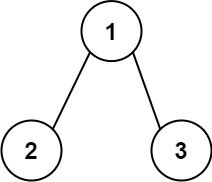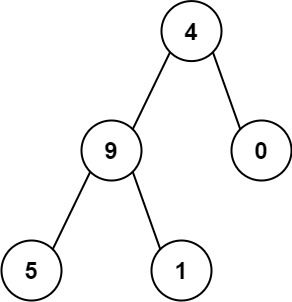You are given the root of a binary tree containing digits from 0 to 9 only.
Each root-to-leaf path in the tree represents a number.
- For example, the root-to-leaf path
1 -> 2 -> 3represents the number123.
Return the total sum of all root-to-leaf numbers.
A leaf node is a node with no children.
Example 1:
Input: root = [1,2,3] Output: 25 Explanation: The root-to-leaf path1->2represents the number12. The root-to-leaf path1->3represents the number13. Therefore, sum = 12 + 13 =25.
Example 2:
Input: root = [4,9,0,5,1] Output: 1026 Explanation: The root-to-leaf path4->9->5represents the number 495. The root-to-leaf path4->9->1represents the number 491. The root-to-leaf path4->0represents the number 40. Therefore, sum = 495 + 491 + 40 =1026.
Constraints:
- The number of nodes in the tree is in the range
[1, 1000]. 0 <= Node.val <= 9- The depth of the tree will not exceed
10.
DFS.
# Definition for a binary tree node.
# class TreeNode:
# def __init__(self, val=0, left=None, right=None):
# self.val = val
# self.left = left
# self.right = right
class Solution:
def sumNumbers(self, root: TreeNode) -> int:
def dfs(root, presum):
if root is None:
return 0
s = 10 * presum + root.val
if root.left is None and root.right is None:
return s
return dfs(root.left, s) + dfs(root.right, s)
return dfs(root, 0)/**
* Definition for a binary tree node.
* public class TreeNode {
* int val;
* TreeNode left;
* TreeNode right;
* TreeNode() {}
* TreeNode(int val) { this.val = val; }
* TreeNode(int val, TreeNode left, TreeNode right) {
* this.val = val;
* this.left = left;
* this.right = right;
* }
* }
*/
class Solution {
public int sumNumbers(TreeNode root) {
return dfs(root, 0);
}
private int dfs(TreeNode root, int presum) {
if (root == null) {
return 0;
}
int s = presum * 10 + root.val;
if (root.left == null && root.right == null) {
return s;
}
return dfs(root.left, s) + dfs(root.right, s);
}
}/**
* Definition for a binary tree node.
* class TreeNode {
* val: number
* left: TreeNode | null
* right: TreeNode | null
* constructor(val?: number, left?: TreeNode | null, right?: TreeNode | null) {
* this.val = (val===undefined ? 0 : val)
* this.left = (left===undefined ? null : left)
* this.right = (right===undefined ? null : right)
* }
* }
*/
function sumNumbers(root: TreeNode | null): number {
return dfs(root);
};
function dfs(root: TreeNode | null, preSum : number = 0): number {
if (!root) return 0;
preSum = preSum * 10 + root.val;
if (!root.left && !root.right) return preSum;
return dfs(root.left, preSum) + dfs(root.right, preSum);
}/**
* Definition for a binary tree node.
* struct TreeNode {
* int val;
* TreeNode *left;
* TreeNode *right;
* TreeNode() : val(0), left(nullptr), right(nullptr) {}
* TreeNode(int x) : val(x), left(nullptr), right(nullptr) {}
* TreeNode(int x, TreeNode *left, TreeNode *right) : val(x), left(left), right(right) {}
* };
*/
class Solution {
public:
int sumNumbers(TreeNode *root) {
return dfs(root, 0);
}
int dfs(TreeNode *root, int presum) {
if (root == nullptr)
return 0;
int s = presum * 10 + root->val;
if (root->left == nullptr && root->right == nullptr)
return s;
return dfs(root->left, s) + dfs(root->right, s);
}
};/**
* Definition for a binary tree node.
* type TreeNode struct {
* Val int
* Left *TreeNode
* Right *TreeNode
* }
*/
func sumNumbers(root *TreeNode) int {
return dfs(root, 0)
}
func dfs(root *TreeNode, presum int) int {
if root == nil {
return 0
}
s := presum*10 + root.Val
if root.Left == nil && root.Right == nil {
return s
}
return dfs(root.Left, s) + dfs(root.Right, s)
}

